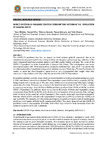IMPACT OF COVID-19 PANDEMIC ON FOOD CONSUMPTION PATTERN IN THE POPULATION OF NAIROBI, KENYA

View/
Date
2021Author
Mbijiwe, Jane
Kiiru, Samuel
Konyole, Silvenus
Ndung’u, Nancy
Kinyuru, John
Metadata
Show full item recordAbstract
The COVID-19 pandemic has had an impact on food systems globally especially due to its
containment measures and this has disrupted food consumption patterns among individuals. The
study compared food consumption patterns and diet quality before and upon the onset of the
COVID-19 pandemic in urban households in Nairobi City, Kenya. The investigation was crosssectional in nature with 1460 respondents, conducted between May-June 2020. The survey link
was disseminated to respondents using online platforms namely WhatsApp, Twitter, Facebook and
emails. A seven-day food frequency questionnaire was incorporated that sought what they
consumed 7-days before and 7-days after the onset of the COVID-19 pandemic.
Descriptive statistics and Chi-square tests were used to determine the association among variables.
A 95% confidence interval was adopted. The respondents were 1460 in total, a majority (52.7%)
being women with a mean age of 49 years, most (58%) were employed and 96% had a college/
university education. There was an increase in the intake of cereals from 62.3% to 72.6%, a decline
in consumption of sugar from 42.5% to 30.8% and dairy products from 70.5% to 58.9% amid the
COVID-19 pandemic. In addition, there was a rise in the intake of fruits and vegetables among
respondents from 56.2% to 66.4% and a decrease in consumption of meat, poultry, fish, and eggs
from 30.1% to 25.3% amid the covid-19 pandemic. This inquiry observed a significant association
between intake of fats and oils with respondents’ occupation (p=0.011), income (p= 0.003) and
age (p<0.001). The majority (67.1%) of the participants reported an improvement in food hygiene
practices while intake of fresh foods deteriorated (50%). The study showed that the COVID-19
pandemic skewed consumption of healthy diets which may influence body immunity hence the
ability to suppress SARS-CoV-2 infection.
